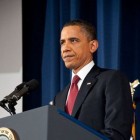
States Consider Armed Police in Schools
|
When news about the school shooting at Sandy Hook Elementary School hit last December, New Jersey police chief Vincent Caruso’s mind started turning. As the head of the police department and a member of the School Board in Lodi, a town of about 25,000 in Bergen County, Caruso knew he had to take an active role in updating the town’s school safety procedures. Armed school resource officers already patrolled Lodi’s middle and high schools, but Caruso, with images of Newtown fresh in his mind, was concerned about the town’s five elementary schools. “That was the first time where it actually hit home at an elementary school,” Caruso, who has three young children in Lodi’s elementary schools, said. “When you start killing kindergarteners and first graders, all bets are off.”
Caruso developed a plan to put retired police officers armed with guns in Lodi’s elementary schools.







